 Kalliope’s
Comments
(group member since Aug 28, 2018)
Kalliope’s
Comments
(group member since Aug 28, 2018)
Kalliope’s
comments
from the Ovid's Metamorphoses and Further Metamorphoses group.
Showing 181-200 of 610
 I have collected a few paintings on Jason.
I have collected a few paintings on Jason.Jacopo del Sellaio. Scenes from the Story of the Argonauts. 1465. Met Museum.
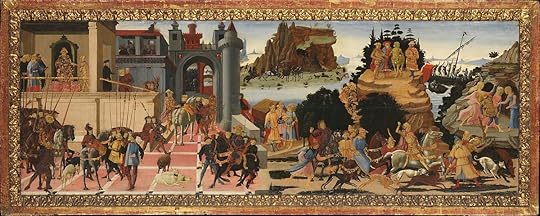
Erasmus Quellinus II, Jason and the Golden Fleece, 1630. Prado.
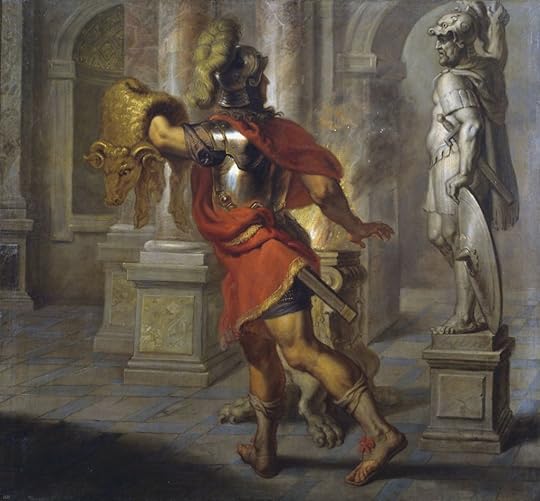
Salvator Rosa. Jason Charming the Dragon. 1665-75. Montreal Museum of Fine Arts.
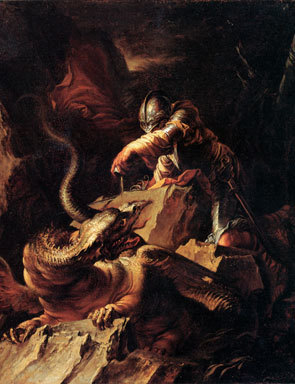
Jean-François Detroit. The Capture of the Golden Fleece. 1742-3. London National Gallery.
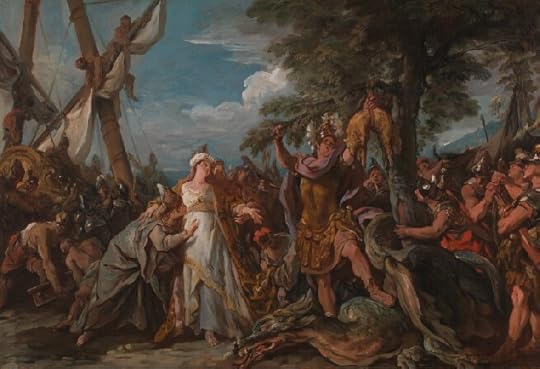
 I was struck by the appearance again of the 'Serpent's Teeth' - and a footnote in my edition confirms that these teeth came from the serpent Cadmus slew and were given to Aeetes by Minerva (out of Apollonius). The poison is thus the serpent's venom.
I was struck by the appearance again of the 'Serpent's Teeth' - and a footnote in my edition confirms that these teeth came from the serpent Cadmus slew and were given to Aeetes by Minerva (out of Apollonius). The poison is thus the serpent's venom.
 On more popular rendition of the Jason and Medea story, there is The Golden Fleece. I read it years ago and enjoyed it.. May be it is time for a revisit.
On more popular rendition of the Jason and Medea story, there is The Golden Fleece. I read it years ago and enjoyed it.. May be it is time for a revisit.
 Roman Clodia wrote: "Did anyone else notice that Medea's is the first long soliloquy in the poem? I wonder if that's formally connected to her canonical appearance in Euripides? Ovid also wrote a play called Medea, sad..."
Roman Clodia wrote: "Did anyone else notice that Medea's is the first long soliloquy in the poem? I wonder if that's formally connected to her canonical appearance in Euripides? Ovid also wrote a play called Medea, sad..."Thank you, RC, for underlining this... Yes, this free space given to a speech by a female provides fresh air.
 One of the most famous Medea paintings is Delacroix's.
One of the most famous Medea paintings is Delacroix's.Eugene Delacroix. 1838. Palais des Beaux-Arts, Lille.

I like the 'greek profile' that Delacroix has given Medea...!!
 Peter wrote: "My favourite Medea paintings
Peter wrote: "My favourite Medea paintings..."
Thank you, Peter, for these paintings. All 19C renditions. Waterhouse continues to provide very striking Ovidian images...
I think I saw somewhere there will be an exhibition in the V&A on the Preraphaelites next Fall.
 Peter wrote: "I particularly liked Medea's inner monolog in the beginning of the book......."
Peter wrote: "I particularly liked Medea's inner monolog in the beginning of the book......."I agree Peter. I have enjoyed the somewhat different presentation of Medea - she is shown from within - so very differently from the the other classic texts (and the stage and film representations I watched not too long ago).
 Elena wrote: "OK I don't usually like best sellers, but Mary Beard's SPQR provides incredible context for the Met. Including things like the way tales of rape are incorporated into foundation myths. I highly rec..."
Elena wrote: "OK I don't usually like best sellers, but Mary Beard's SPQR provides incredible context for the Met. Including things like the way tales of rape are incorporated into foundation myths. I highly rec..."Thank you, Elena. I have Beard's book in my Kindle waiting for my attention.
 Very busy here too. I have several posts pending. And I am soon going to the Callisto opera. I will report on it afterwards.
Very busy here too. I have several posts pending. And I am soon going to the Callisto opera. I will report on it afterwards.
 I will search for more images but there is one that comes up quickly in my mind since I have seen it several times.
I will search for more images but there is one that comes up quickly in my mind since I have seen it several times.Ercole de Roberti. The Argonauts Leaving Colchis. 1480. Thyssen-Bornemisza Museum, Madrid.

Very appealing Renaissance visualisation. Looks like a court scene.
 Roman Clodia wrote: "I was giving a paper at a conference on Ovid this week and heard that Penguin are planning a new translation of the Met. by Stephanie McCarter. I don't know her but she's a classi..."
Roman Clodia wrote: "I was giving a paper at a conference on Ovid this week and heard that Penguin are planning a new translation of the Met. by Stephanie McCarter. I don't know her but she's a classi..."Oh, good for you on the Ovid conference.. On what aspect will you concentrate?
 Jim wrote: "Any extended discussion of Medea cannot avoid invoking Cherubini's dramatic French opera Médée -- and in turn the historic performance of the lead role by Maria Callas (alas, an event I was never a..."
Jim wrote: "Any extended discussion of Medea cannot avoid invoking Cherubini's dramatic French opera Médée -- and in turn the historic performance of the lead role by Maria Callas (alas, an event I was never a..."Thank you, Jim, for the info on Cherubini.
On Callas, there is the Pasolini film in which she acts as Medea with no singing whatsoever. I watched this when I was very young and it impressed me. I then watched it again a couple of years ago.
The full film is in YT. Alas, I have not found it with subtitles.
https://www.youtube.com/watch?v=uMzHc...
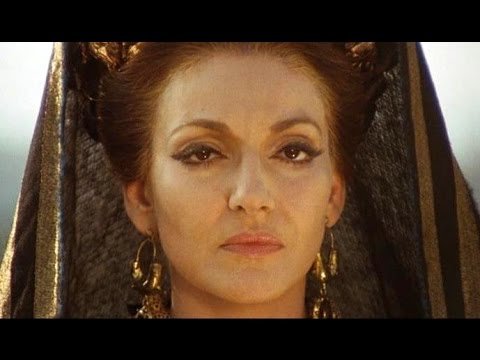
 Historygirl wrote: "Ovid telling the story of Jason and the Golden Fleece from Medea’s point of view confounded my expectations once again. He avoids the often told tales by shifting the focus. The first beautifully l..."
Historygirl wrote: "Ovid telling the story of Jason and the Golden Fleece from Medea’s point of view confounded my expectations once again. He avoids the often told tales by shifting the focus. The first beautifully l..."Yes, what I have found most striking in this version is to get Medea's point of view, including her self-doubts. But hers is not the only narrative voice.
I don't think we have encountered this way of narrating so far, even when we get some dialogues.
 Jim wrote: "The Medea story, one of the most complex and intriguing tales in the Met raises a number of questions. To begin with, Ovid’s version doesn’t seem to coincide very well with some others; e.g. accord..."
Jim wrote: "The Medea story, one of the most complex and intriguing tales in the Met raises a number of questions. To begin with, Ovid’s version doesn’t seem to coincide very well with some others; e.g. accord..."The other sources I know of Medea are the Euripides and the Seneca.
I watched an unforgettable production of the Seneca version. There was a very strong scene in which the magic powers were enacted.. it was intoxicating.. I remember how I gradually sank into my seat with all strength gone. Here is an image.
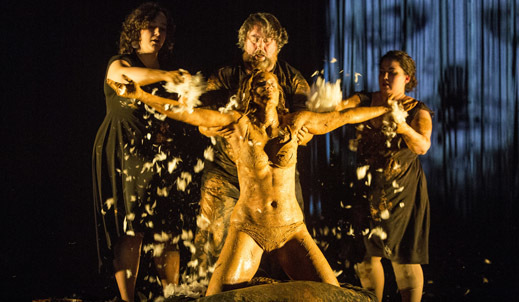
 Roman Clodia wrote: "Medea's speech is also the basis for Prospero's big farewell to magic towards the end of The Tempest. .."
Roman Clodia wrote: "Medea's speech is also the basis for Prospero's big farewell to magic towards the end of The Tempest. .."This is very interesting.. to keep in mind next time I read/watch The Tempest.
 Hello everyone. I am back, but catching up with things. Will come back to the thread hopefully tomorrow.
Hello everyone. I am back, but catching up with things. Will come back to the thread hopefully tomorrow.
 I am going to be away for one week. I am off to Seville. I won't see much mythology while over there.. most of the art I will see will be religious.
I am going to be away for one week. I am off to Seville. I won't see much mythology while over there.. most of the art I will see will be religious.I have read this Book a bit fast. I will post the paintings, and films, when I am back.
 I have found a few more paintings on Boreas and Orithyas. Less violent than Rubens's version and less distilled than Waterhouse's. The emphasis is on the flying - suitable for a wind..
I have found a few more paintings on Boreas and Orithyas. Less violent than Rubens's version and less distilled than Waterhouse's. The emphasis is on the flying - suitable for a wind..Giovanni Francesco Romanelli. 17C. Galleria Spada.

A very busy one... It takes a while for one's eyes to work out everything going on.
Francesco Solimena. 1730. Walter Arts Museum.
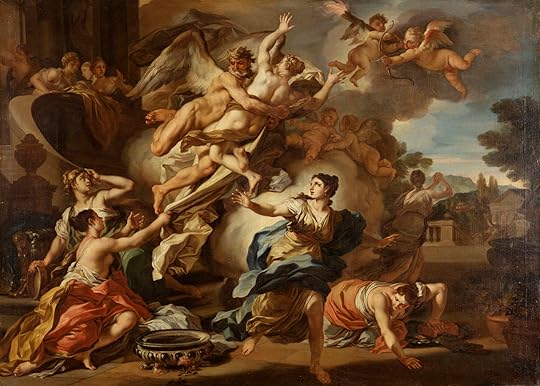
With a very different tone.. A smooth abduction.
Joseph-Ferdinand Lancrenon. 1822. Unidentified Location.

A very colourful one and owing to Rubens in the posture of the protagonists, although the tone has changed.
Sebastiano Conca. 18C. Louvre.
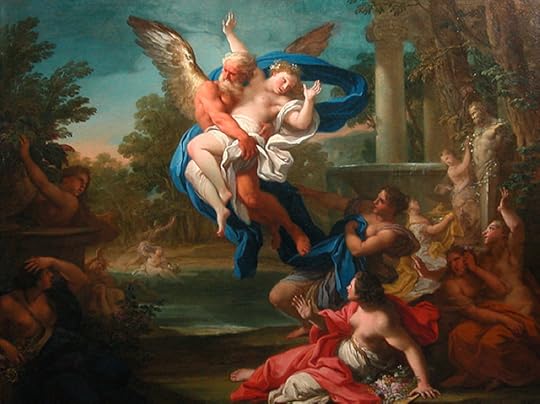
A very peculiar Boreas - swimming in the air.
Osvald von Glehn. 1879. Unidentified location.
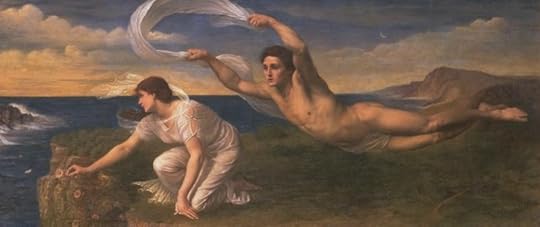
This is another theme that was very popular for a while but the masters who tackled it are not amongst the more famous now. The episode is therefore less familiar pictorially.
 Lovely image from a Medieval illuminated manuscript. Possibly Philomela's weave.
Lovely image from a Medieval illuminated manuscript. Possibly Philomela's weave.Unfortunately I don't have details on the image.
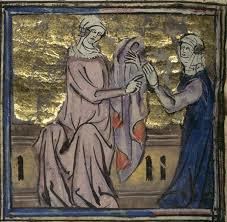
 The rape of Philomela is certainly horrible to read... and as RC mentioned, the somewhat ambiguous treatment of the hacked off tongue, is very disturbing.
The rape of Philomela is certainly horrible to read... and as RC mentioned, the somewhat ambiguous treatment of the hacked off tongue, is very disturbing. In this second read I noticed that then Tereus raped her several times after the mutilation.
There is no ambiguity in the treatment of Tereus.

